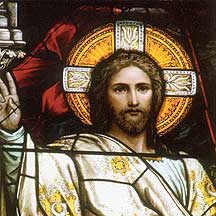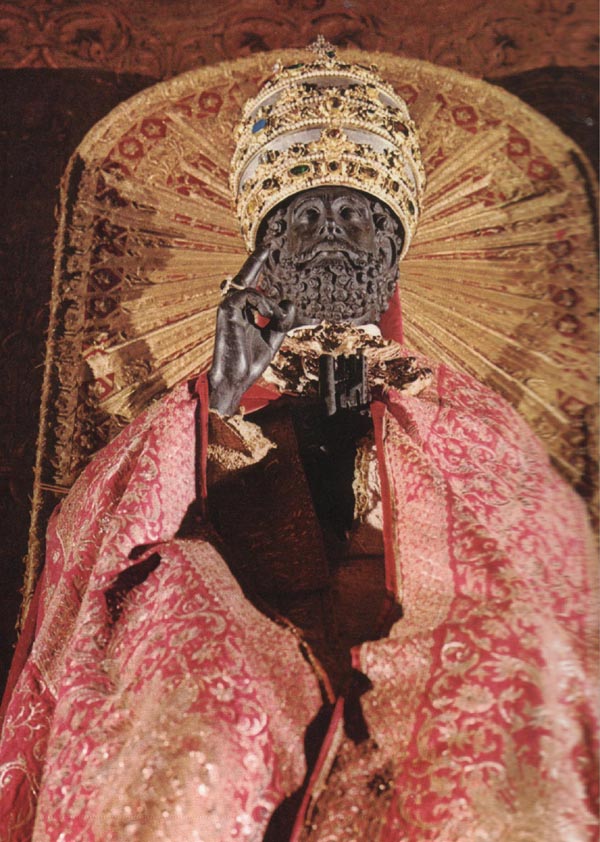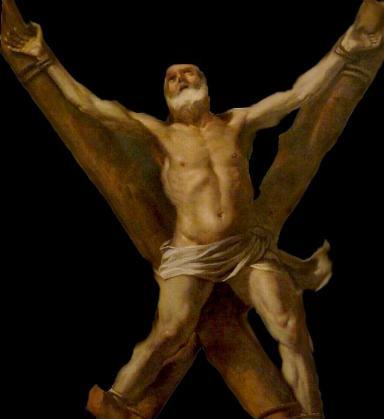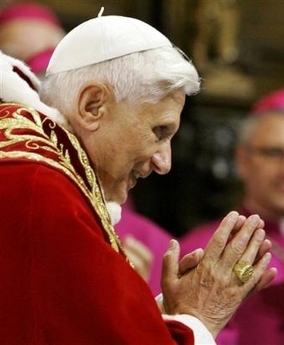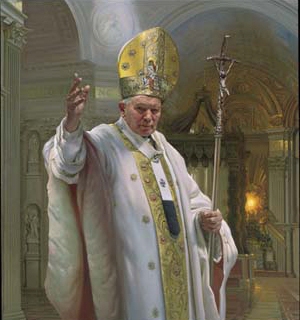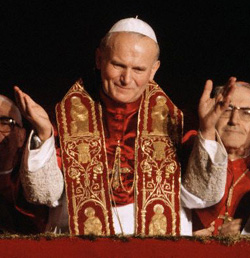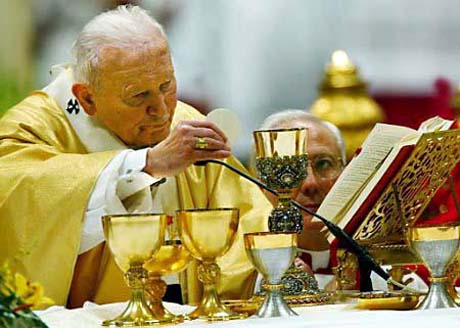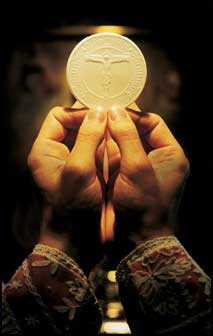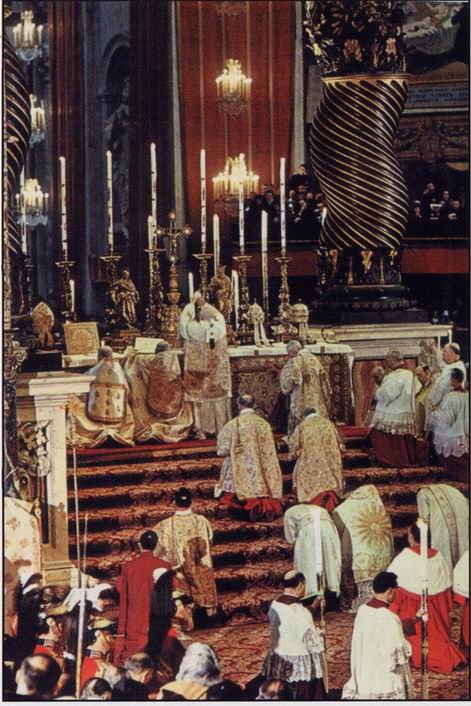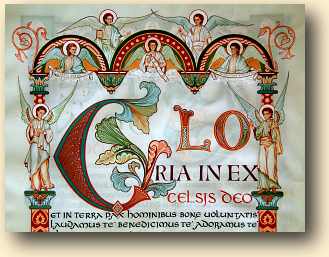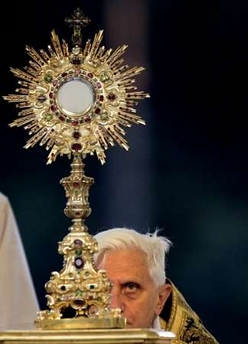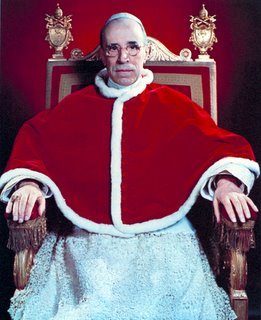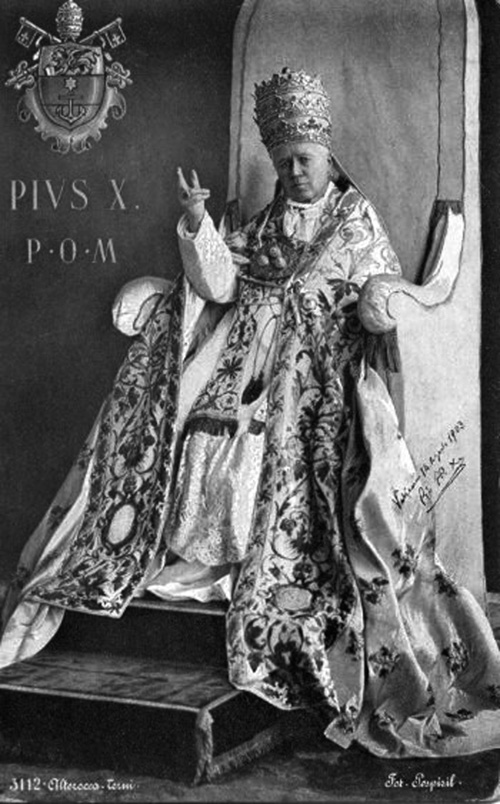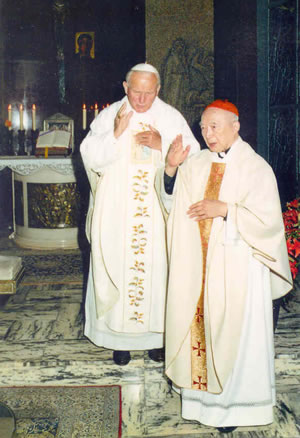Dear non-denom friend. You got me. As in got me interested. =) My old interest is piqued. Though it's way past midnight here, I've decided to write you a response since by responding to me, you in turn deserve a full response from me.

Before we get offtrack, let's stick with one issue first and then move on from there because these carpet bomb techniques can result in me trying to rush off answers all over the place but not answer a question satisfactorily.
Let's start back with the Father issue. I'm going to take your comments related to the Father issue and answer them first before moving on to another issue. I hope this is okay so we can look at each issue systematically before moving on.
You said this:
Now, moving on to the "Call no man father.."... Now Jesus is not referring to the literally tense of "father" as in a man who has biological children.. no not all..

Not that I disagree with you here, but please show me, from Scriptures alone, how you reached the conclusion that Jesus was not talking about biological fathers. I used God's gift of reason to sift the Scriptures to reach that conclusion. You critiqued my approach, demanding chapter and verse. I now ask the same. I believe, if I take the literal approach as you take it, Jesus says this:
Do not call anyone on earth your father; for One is your Father, He who is in heaven. -Matt 23:9
Seems pretty straightforward to me. Call NO MAN ON EARTH FATHER. And then he contrasts earthly fathers to the One Father in Heaven. Crystal.
There are no escape clauses, no caveats, no exceptions. Call no man on earth Father, that's it. So, if I'm being an absolute literalist, then I might ask you which part of 'Call no man on earth father' don't you understand? Is it 'call', or 'man' or 'on earth' or 'father'? How did you come to the conclusion, based on the Scriptures alone, that Jesus meant your mother's husband and my mother's husband is somehow exempt?
Good luck on that, BTW =)
Second, and as I've noted in my first response, you totally conveniently forgot about the first part of the the prohibition. To refresh your memory, I present it here to you again:
"But do not be called Teacher; for One is your Teacher, and you are all brothers. Do not call anyone on earth your father; for One is your Father, He who is in heaven. "–Matt 23:8-9
You did not interact or explain away how is it that we may call people teachers when Jesus, apparently clearly says that "Do not be called teacher". We must not be selective in our application and make exemptions when we see fit.
How do you reconcile that with the many mentions of the office of teachers with Jesus' apparent prohibition?
 Now there were at Antioch, in the church that was there, prophets and teachers: -Acts 13:1
Now there were at Antioch, in the church that was there, prophets and teachers: -Acts 13:1
And God has appointed in the church, first apostles, second prophets, third teachers, then miracles, then gifts of healings, helps, administrations, various kinds of tongues. All are not apostles, are they? All are not prophets, are they? All are not teachers, are they? All are not workers of miracles, are they? -Cor 12:28-29
 And He gave some as apostles, and some as prophets, and some as evangelists, and some as pastors and teachers, for the equipping of the saints for the work of service, to the building up of the body of Christ; -Eph 4:11-12
And He gave some as apostles, and some as prophets, and some as evangelists, and some as pastors and teachers, for the equipping of the saints for the work of service, to the building up of the body of Christ; -Eph 4:11-12
But false prophets also arose among the people, just as there will also be false teachers among you, who will secretly introduce destructive heresies, even denying the Master who bought them, bringing swift destruction upon themselves. -2Pet 2:1 [This verse, talking about false prophets and false teachers necessarily presupposes true prophets and true teachers. Therefore, as there were teachers, the 'Do not be called teachers' cannot be an absolute prohibition]

In New Testament times, as now, there were in fact, teachers. A teacher is a calling and a spiritual gift in the Church. How do you explain this exemption if the prohibition were absolute?
Furthermore, Jesus Himself, before the Ascension, tasked the Apostles in the Great Commission to:
Therefore go and make disciples of all nations, baptizing them in the name of the Father and of the Son and of the Holy Spirit,
and
teaching them to obey everything I have commanded you. - Mat 28:19-20
He thus made them teachers. A teacher is someone who teaches. Are the Apostles exempt from that clause?

You're taking the prohibition against calling any man on earth father and applying exclusively to the Catholic priesthood. You conveniently exempt men who have children from this. And then you also conveniently exempt the good men and women who teach. How can this be? Please justify this. It's easier to question than to justify, no? LOL!
What do you suppose Jesus called St. Joseph, for example?
The fact it, as I have explained with numerous Scripture quotations, that the prohibition is not an absolute one. I gave many examples of spiritual fatherhood and of the Apostles calling themselves fathers and calling others their sons which I will not repeat. But if you really need it, tell me your favourite version of the Bible and I'll look up the references for you and include them.
I can, on the other hand conclusively show that Jesus did not mean from this verse that we cannot address human beings in terms of respect.
The Scriptures, inspired by the Holy Spirit, records that men were called father by the authors of Scripture.

In the speech of St. Stephen which I quoted, we find St. Stephen calling the Patriarch Abraham father.
And he said, "Hear me, brethren and fathers! The God of glory appeared to our father Abraham when he was in Mesopotamia, before he lived in Haran - Acts 7:2
Abraham is a man. Abraham is called Father Abraham by several other people as well. For example, in the parable of Lazarus which Jesus Himself told, these words came from Jesus' lips:
"And he cried out and said, 'Father Abraham, have mercy on me, -Luke 16:24
But he said, 'No, father Abraham, but if someone goes to them from the dead, they will repent!' - Luke 16:30
Abraham is a man.

You then said, in an attempt to explain away St. Stephen's address of the Sanhedrin as fathers, an honorary title, an exalting title perhaps, that:
Again, as I stated before, when Stephen said "Hear me brethren and fathers.." he was addressing literal fathers..
Errr. not buying that at all. I would be happy if you could prove it. And also if you could explain why St. Stephen had more than one father and how both (or more) of them happen to be sitting in the Council. LOL! That would be fun. But if you read Acts 6 in the choosing of the Deacons, you'll note that the Greek speaking Jews (presumably from the diaspora) were complaining against the Hebrew speaking Jews (from Palestine) about their widows getting neglected. In response, the Apostles appoint 7 men, with Greek names, to be Deacons. In fact, one, a certain Nicholas of Antioch, is even a convert to Judaism. It's therefore highly unlikely that St. Stephen would have a literal flesh and blood father in the Sanhedrin. And even if he did, then Jesus could still have just asked him 'Which part of "Call NO MAN ON EARTH FATHER" did you not understand?' Hehe... Unless you can prove from Scripture that there exists such an exemption, then the question is for you too, my friend.

Now look at Acts 22:1. St. Paul is here speaking to a crowd in front of the Temple. Look how he addresses them:
Brothers and fathers, listen now to my defense."-Acts 22:1
Hmmm.... did St. Paul not learn of Jesus prohibition? Was he not reading his Bible like a good boy? LOL! Did he have many fathers and brothers among the crowd too, who happen want to kill him?
St. Stephen and St. Paul use the title here in addressing elders to honour them or address them honorably. So, once again, clearly, from the Scriptures, we can see that Jesus' prohibition against calling anyone of earth Father, calling anyone teacher(including anyone with a Ph.D because doctor is simply Latin for teacher) or master (including people with a Master's degree) is not absolute. Otherwise the NT evangelists and saints, inspired by the same Holy Spirit that descended on Jesus during His Baptism, would not have inspired them to utter such words.
God is not a God of confusion. -1Cor 14:33 Therefore we will not put conflicting words and meanings within the inspired Scriptures.
You also said:
He is talking about someone taking on the TITLE as "Father" as a means to exalt themselves.."Call no one Rabbi because you are all brothers.." Meaning that WE humans are all on the same level (we are brothers), no one is above another as God is above us.
Read the rest of that verse and He clearly explains that.. He is referring to the title of "FATHER" as a means of "Lordship"..You took that out of context completely.
I would ask you to show me where have taken it out of context. I have read the verse, the chapter and the whole book. I find nothing of the sort.

On the contrary, I went to great lengths to provide context, including giving the preceding verse of 'Do not be called teacher' (which you did not interact with, BTW). It's as simple as that. Can't call no one father or teacher. Period. If you make exceptions, them prove it from the Bible. If you think my interpretation is wrong, show me, from the Bible. Instead, I see you sticking with that one verse (call no man on Earth father), totally out of context and attacking the Catholic practice without offering any other Scriptural support.
On the issue of using the title father as a means of exalting people, what do you think St. Paul and St. Stephen were doing when they used the title Fathers to address the Sanhedrin and the crowds respectively? It is not a means of exalting or paying due respect to the crowd/Council?
You said:
Now as far the spiritual son, that is not exalting onesself with the title of "father",but as a mentor which is what being a father is and in that context, he was not requesting "father" to be a "title". In my church, I have spiritual mothers, brothers, sisters, and fathers but not in the sense of "HOLY FATHER" as you call the pope or that I exalt them... No not at all.. We are all the same.
The title "Father" that Jesus was talking about is when someone uses that title as a means of lordship-Not a mentor which is what being a father means.


LOL! A rose by any other name would smell as sweet. If I were petty and mean, I could ask you, for example, to prove from the Scriptures where you got the idea that "
a mentor which is what being a father means". You'll pardon me if I don't buy that without proof.

And, horror of horrors(!), Dioctionary.com gives, as it's first definition of mentor: "
a wise and trusted counselor or teacher". Argghhhh!!!!! Mentors (aka teachers) are going to hell!!!!... Well, no, I'm not going to be petty and mean, so I won't ask that question. I'm pretty nice if you get to know me =) LOL!
Actually, let me tell you that in the Catholic Church, priests are, as you so succinctly put it "
a mentor which" encompasses a part of "what being a father means". In the Catholic Church, the use of the title Father to address priests does not in anyway mean or intend to
"exalt onesself with the title of "father",but as a mentor which is" a part of the function carried out by a father, part of what "
being a father is".

We do not and have never intended to use the title of father on our priests as a means of exalting them to the point that they Lord it over us. Why, the Scriptures prohibit that. I am thrilled that you see it our way too.
And if you know us Catholics, you'll know that anyone trying to Lord anything over them is in for a big pile of doo doo LOL!
Cheers and G'nite.
PS
More answers forthcomin, about the Pope, the Church, non-denominationalism and all that. In fact, it's in draft mode, pics and all but I just can't find the time to put it together. Do be patient. Mahalo!
PPS
A parting shot... couldn't resist!
I do not write these things to shame you, but to admonish you as my beloved children. For if you were to have countless guardians in Christ, yet you would not have many fathers, for in Christ Jesus I became your father through the gospel. Therefore I exhort you, be imitators of me.
For this reason I have sent to you Timothy, who is my beloved and faithful child in the Lord, and he will remind you of my ways which are in Christ, just as I teach everywhere in every church.
-1Cor 4:14-17
Poor St. Paul. A Father and a Teacher. Yikes! Double whammy. And asking people to imitate him... Sheesh...
![]() Catholic, from the Greek word meaning universal, is actually an attribute of Christ’s Church. It’s one of the Four Marks of Christ’s
Catholic, from the Greek word meaning universal, is actually an attribute of Christ’s Church. It’s one of the Four Marks of Christ’s  Over the years, various people have broken away from Christ’s Catholic Church. Even in New Testament times, there were followers such those of as Nicolaites named in Rev 2:15. These groups bear the names of their founders (such as the Lutherans or Calvinists), their peculiar practices (such as the Methodists and the Baptists) their geographic location or nationality (such as the Anglicans), their form of government (such as the Presbyterians and Episcopalians) and what not. Some call their newly minted foundation the
Over the years, various people have broken away from Christ’s Catholic Church. Even in New Testament times, there were followers such those of as Nicolaites named in Rev 2:15. These groups bear the names of their founders (such as the Lutherans or Calvinists), their peculiar practices (such as the Methodists and the Baptists) their geographic location or nationality (such as the Anglicans), their form of government (such as the Presbyterians and Episcopalians) and what not. Some call their newly minted foundation the  The closest group to the Catholic Church are those Churches known as the Oriental Orthodox or Eastern Orthodox Churches which separated themselves from the Catholic Church very early on starting from the Council of Chalcedon in 451 and the Schism of 1054 respectively. Though some, like the Oriental Orthodox, which have been separated from the Catholic Church over Christological issues for more than 1500 years, still maintain the three-fold ministry of bishop, priest and deacon, have a great veneration of the Blessed Virgin, believe in the Real Presence of Christ in the Eucharist, call their priests father, use images and icons in their worship and acknowledge the primacy of the Bishop of Rome amongst all the Bishops. This testifies to the great antiquity of certain practices that come under criticism.
The closest group to the Catholic Church are those Churches known as the Oriental Orthodox or Eastern Orthodox Churches which separated themselves from the Catholic Church very early on starting from the Council of Chalcedon in 451 and the Schism of 1054 respectively. Though some, like the Oriental Orthodox, which have been separated from the Catholic Church over Christological issues for more than 1500 years, still maintain the three-fold ministry of bishop, priest and deacon, have a great veneration of the Blessed Virgin, believe in the Real Presence of Christ in the Eucharist, call their priests father, use images and icons in their worship and acknowledge the primacy of the Bishop of Rome amongst all the Bishops. This testifies to the great antiquity of certain practices that come under criticism.![[Unam Sanctam]](https://blogger.googleusercontent.com/img/b/R29vZ2xl/AVvXsEiymQ2adTjpZ1ABhPBbBBquiPCxeQrc4Jy_97vOikT0wGQeJleriiXQy6ebnb0jrYe-TfvcK77txStB4aIwVAdD41ZdMkVfNtFGC0JX6LBV9B8mfeRZaIAM7Sj-011ag3DiKQzv/s1600/headerdivinemercy.jpg)



















































